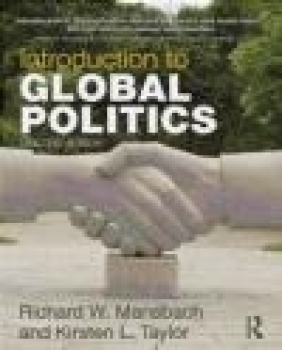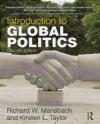Introduction to Global Politics
Kirsten Taylor, Richard Mansbach
Introduction to Global Politics
Kirsten Taylor, Richard Mansbach
- Producent: Routledge
- Rok produkcji: 2011
- ISBN: 9780415782722
- Ilość stron: 632
- Oprawa: Miękka
Niedostępna
Opis: Introduction to Global Politics - Kirsten Taylor, Richard Mansbach
Fully revised and updated, the second edition of Introduction to Global Politics places an increased emphasis on the themes of continuity and change. It continues to explain global politics using an historical approach, firmly linking history with the events of today. By integrating theory and political practice at individual, state, and global levels, students are introduced to key developments in global politics, helping them make sense of major trends that are shaping our world. This is a highly illustrated textbook with informative and interactive boxed material throughout. Chapter opening timelines contextualise the material that follows, and definitions of key terms are provided in a glossary at the end of the book. Every chapter ends with student activities, cultural materials, and annotated suggestions for further reading that now include websites. Key updates for this edition: * New chapter on 'The causes of war and the changing nature of violence in global politics' * New chapter on 'Technology and global politics' * Enhanced coverage of theory including post-positivist theories * Uses 'levels of analysis' framework throughout the text * New material on the financial crisis, BRIC and Iran Introduction to Global Politics continues to be essential reading for students of political science, global politics and international relations. 'A solid volume for either one or two semester introductory courses in International Politics. Aimed at today's students, who need a text with significant historical background and demand consideration of contemporary problems, Introduction to Global Politics delivers the basics and much more. With its useful timelines, attention-getting boxes, rich array of excerpts from key documents, and such a thorough discussion of contemporary issues as to make a supplementary work unnecessary, this text warrants serious consideration.' - Joseph R. Rudolph, Jr., Towson University, USA 'Introduction to Global Politics is a first rate text. It is exhaustive in its coverage of issues and ideas, extremely well informed by history and theory and also engagingly written and produced. Mansbach and Taylor have produced one of the best books on the market.' - Nick Bisley, La Trobe University, Australia 'The publication of the first edition of Introduction to Global Politics gave students of International Relations a textbook that approached global politics and events and themes using the analytical perspectives and frameworks that underpin the discipline of International relations. Thus, in one textbook, students gained not only an historical/political grounding, but also an understanding of the uses and practice of theory and analysis and the different interpretations of events that result with different frameworks of analysis. This new edition continues this approach, with the same lucid, but lively, writing style and crystal clear explanations of theory and analysis, utilising both historical and contemporary political examples to illuminate and make more relevant the analysis. The changes in this edition reflect the changes in today's world, identifying and scrutinizing the major issues and themes, and thus equipping students with both the analytical tools and the knowledge that they need to successfully analyse global politics.' - Caroline Page, Coventry University, UK 'Mansbach and Taylor expertly explain today's global political challenges in historical and cultural context, helping students to understand the alternative approaches to dealing with conflict, and to building cooperation, that human societies have imagined and attempted. Global politics emerge from these pages not as a static set of constraints and imperatives, but as a dynamic, ever-changing, multi-dimensional reality -- a world in which ideas, identities, interests, and institutions are constantly evolving. This is a world in which individuals have the capacity to change the realities which are shaping their lives, a world in which knowledge and understanding open doors to new possibilities.' - Edward Rhodes, George Mason University, USA 'Theory, history, and current issues are masterfully woven together in this important new book. The authors' excellent use of vivid real-life examples, figures, pictures, timelines and sideboxes, all serve to illustrate theoretical concepts in a way that will grab the attention of undergraduate and graduate students alike; and with its thought-provoking discussion and essay questions, this textbook virtually teaches itself. A major contribution to the learning and understanding of globalization, this book is evidence that globalization studies have truly come into their own.' - Ersel Aydinli, Bilkent University, TurkeyPart 1: Theory and Global Politics 1. Theoretical Approaches to Global Politics 1.1 What is Theory and Why Do We Need It? 1.2 Many Theories, Many Meanings 1.3 Many Theories, Many Meanings 1.4 Levels of Analysis 1.5 Making Sense of a Complex World: Theory and Global Politics 1.6 Conclusion Part 2: The Past as Prologue to the Present 2. The Evolution of the Interstate System and Alternative Global Political Systems 2.1 The Eemergence of the European Interstate Ssystem 2.2 China: The Confucian Empire 2.3 Islam's Founding and Expansion 2.4 Conclusion 3. The World Wars 3.1 Events Leading to the Great War 3.2 Explaining the Outbreak of World War One 3.3 The Peace of Versailles 3.4 The Failure of Collective Security 3.5 Appeasement and its Consequences 3.6 On the Road to Pearl Harbor 3.7 Individual-Level Explanations 3.8 Unit-Level Explanations 3.9 System-Level Explanations 3.10 Conclusion 4. The Cold War 4.1 Explaining the Origins of the Cold War 4.2 The Cold War Spreads and Deepens 4.3 The Cold War Winds Down 4.4 The End of the Cold War 4.5 Russia after the Cold War 4.6 Conclusion 5. The Global South 5.1 Europe's Empires 5.2 The Decolonization of Asia and Africa 5.3 The Politics of Nonalignment, Nation Building and Economic Development 5.4 The BRICs and Global Governance 5.5 An Economic Giant Awakens 5.6 Conclusion 6. Globalization: The New Frontier 6.1 Features of Globalization 6.2 The Historical Roots of Globalization 6.3 Competing Perspectives on Globalization 6.4 The Globalization Debate 6.5 The State in Decline? 6.6 Conclusion Part 3: Living Dangerously in a Dangerous World 7. Great Issues in Contemporary Global Politics 7.1 The Nuclear Proliferation Regime 7.2 China and the United States: A New Bipolarity? 7.3 Israel and Palestine 7.4 Militant Islam: The "Green Menace" 7.5 9/11 and the War on Terrorism 7.6 The Changing Middle East 7.7 Conclusion 8. The Causes of War and the Changing Nature of Global Violence 8.1 The Quest for Power and Influence 8.2 The Causes of Interstate War 8.3 The Causes of Intrastate War 8.4 Managing Intrastate War 8.5 Irregular Warfare 8.6 Conclusion 9. Technology and the Changing Face of Warfare 9.1 War as an Extension of Politics 9.2 On the Road to Total War: The World Wars 9.3 Technology and Interstate War 9.4 Strategies in a Nuclear Age 9.5 The Era of Smart Weapons 9.6 Cyberwar 9.7 Conclusion Part 4: Global Actors and Institutions 10. International Law and Organization and the Quest for Peace 10.1 The "Law of Nations" 10.2 International Organizations 10.3 The League of Nations 10.4 The United Nations 10.5 Regional International Organizations 10.6 International Oganizations and Peace 10.7 Conclusion 11. Human Rights: The Individual in Global Politics 11.1 The Holocaust and the Genocide Convention 11.2 The Nuremberg Precedent and the Evolution of International Criminal Tribunals 11.3 Individual Rights under International Law 11.4 Women's Rights as Human Rights 11.5 Conclusion Part 5: Global Issues 12. Human Security 12.1 The Idea of Human Security 12.2 Poverty and Economic Development 12.3 Transnational Crime 12.4 The Arms Trade 12.5 The Global Movement of Persons 12.6 Globalized Diseases 12.7 Conclusion 13. Identity Politics: Nationalism, Religion, and Ethnicity 13.1 Multiple Identities 13.2 Manipulating Identities 13.3 Nationalism 13.4 Religious Identities 13.5 Ethnic Identities 13.6 The Brutal Break-Up of Yugoslavia 13.7 Approaches to Culture 13.8 Conclusion 14. International Political Economy 14.1 The Beginnings of a Global Economy 14.2 Theories of Political Economy 14.3 The Great Depression 14.4 The Bretton Woods Institutions 14.5 Hegemonic Stability 14.6 Transnational Corporations: Engines of Global Capitalism 14.7 States and Markets 14.8 The Asian Contagion 14.9 The American Contagion 14.10 Conclusion 15. The Environment: A Global Collective Good 15.1 Collective Goods and Collective Fates 15.2 Population and Environment 15.3 Deteriorating Global Ecology 15.4 Conclusion Part 6: And Tomorrow? 16. Epilogue: A Future Dimly Seen 16.1 Alternative Futures 16.2 Conclusion: An Uncertain Future
Szczegóły: Introduction to Global Politics - Kirsten Taylor, Richard Mansbach
Tytuł: Introduction to Global Politics
Autor: Kirsten Taylor, Richard Mansbach
Producent: Routledge
ISBN: 9780415782722
Rok produkcji: 2011
Ilość stron: 632
Oprawa: Miękka
Waga: 1.3 kg






















